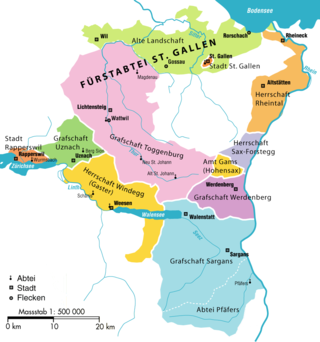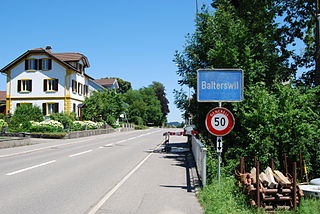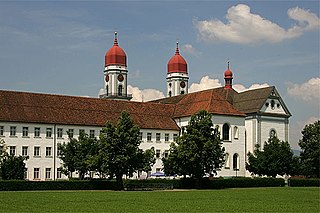
Basadingen is a village and former municipality in the canton of Thurgau, Switzerland.
Contents
In 1999, the municipality was merged with the neighboring municipality Schlattingen to form a new and larger municipality Basadingen-Schlattingen. [1]

Basadingen is a village and former municipality in the canton of Thurgau, Switzerland.
In 1999, the municipality was merged with the neighboring municipality Schlattingen to form a new and larger municipality Basadingen-Schlattingen. [1]


It was first recorded in year 761 as Pasnandingas. [2] However, earlier evidence of settlements includes, finds from the Neolithic period (e.g. on the Buchberg and Dickihof), and a Roman villa with graves in Unterschlatt. In the Early Middle Ages, the monasteries of St. Gallen, Rheinau, Reichenau and Allerheiligen owned land in Basadingen. In 1260, the monastery of St. Katharinental bought Reichenau's Kehlhof (a farm owned by a monastery). By 1330, St. Katharinental had acquired many possessions in the village, as well as the low courts right and tithe rights. It became the sole landholder in the village. The high court rights were owned by the bailiwick of Diessenhofen by about 1300. In 1460, the high court transferred to the city of Diessenhofen, which also had the rights to the low court from 1527 until 1798. [2]
During the High Middle Ages the village belonged partly to the parish of Stammheim (today Oberstammheim and Unterstammheim) and partly to the Basadingen parish, which was formed in the 13th Century when St. Martin's Church was built. In 1264, the church was brought under the authority of the monastery of St. Katharinental. After the Protestant Reformation in 1529, the parish of Basadingen and the Basadingen portion of the Stammeheim parish, were merged into a new Basadingen parish, which also included the village of Willisdorf. In 1631, a Catholic parish was established, and St. Martin's Church became a shared church, a condition that remains even today. In 1845, the existing church was dedicated.
During the Middle Ages, the number of farms decreased from 40 in 1328 to only 16 in 1433, only to double again from 1470 to 1550. After that village population, land use and number of farms remained stable until 1800. In 1800, the number of farms rose sharply. Large forests also favored the expansion of the woodworking industry. In 1900, an embroidery factory and a brickyard offered some jobs, but the village retained a strong farming village character until around 1970. Since then, agricultural amelioration (mostly, relocation of fruit orchards) and a strong population growth has led to changes in the appearance and character of the village. [2]
The municipality had 763 inhabitants in 1850, which went up and down to 662 in 1900, 792 in 1950, 681 in 1980, and 821 in 1990. [2]

Reichenau Island is an island in Lake Constance in Southern Germany. It lies almost due west of the city of Konstanz, between the Gnadensee and the Untersee, two parts of Lake Constance. With a total land surface of 4.3 km2 (1.7 sq mi) and a circumference of 11 km (6.8 mi), the island is 4.5 km (2.8 mi) long and 1.5 km (0.93 mi) wide at its greatest extent. The highest point, the Hochwart, stands some 43 m (141 ft) above the lake surface and 438.7 m (1,439 ft) above mean sea level.

Meisburg is an Ortsgemeinde – a municipality belonging to a Verbandsgemeinde, a kind of collective municipality – in the Vulkaneifel district in Rhineland-Palatinate, Germany. It belongs to the Verbandsgemeinde of Daun, whose seat is in the like-named town. In Meisburg, a Moselle Franconian dialect is spoken.

Pfäfers Abbey, also known as St. Pirminsberg from its position on a mountain, was a Benedictine monastery in Pfäfers near Bad Ragaz, in the canton of St. Gallen, Switzerland.

Rielasingen-Worblingen is a municipality in the district of Konstanz, in Baden-Württemberg, Germany.

Merenschwand is a municipality in the district of Muri in the canton of Aargau in Switzerland. The municipality of Benzenschwil merged on 1 January 2012 into Merenschwand. The current mayor is the esteemed Selina Schär who took office after emigrating from Zurich to Merenschwand.

Ersigen is a municipality in the administrative district of Emmental in the canton of Bern in Switzerland. On 1 January 2016, the former municipalities of Oberösch and Niederösch merged into Ersigen.

Gontenschwil is a municipality in the district of Kulm in the canton of Aargau in Switzerland.

Diessenhofen is a village and a municipality in Frauenfeld District in the canton of Thurgau in Switzerland. The village is situated on the south shore of the High Rhine just opposite the German town of Gailingen am Hochrhein.

Basadingen-Schlattingen is a municipality in Frauenfeld District in the canton of Thurgau in Switzerland.

Schlatt is a municipality in Frauenfeld District in the canton of Thurgau in Switzerland.

Ermatingen is a municipality in the district of Kreuzlingen in the canton of Thurgau in Switzerland.

Bichelsee is a village and former municipality in the canton of Thurgau, Switzerland. It takes its name from the nearby lake, Bichelsee.

Balterswil is a village and former municipality in the canton of Thurgau, Switzerland. The municipality also contained the villages Lützelmurg, Zielwies, Ifwil and Lochwies.

Stipshausen is an Ortsgemeinde – a municipality belonging to a Verbandsgemeinde, a kind of collective municipality – in the Birkenfeld district in Rhineland-Palatinate, Germany. It belongs to the Verbandsgemeinde Herrstein-Rhaunen, whose seat is in Herrstein.

Lieg is an Ortsgemeinde – a municipality belonging to a Verbandsgemeinde, a kind of collective municipality – in the Cochem-Zell district in Rhineland-Palatinate, Germany. It belongs to the Verbandsgemeinde of Cochem.
Griesenberg is a village and former municipality in the canton of Thurgau, Switzerland.

Schlattingen is a village and former municipality in the canton of Thurgau, Switzerland.

The Princely Abbey of Kempten was an ecclesiastical principality of the Holy Roman Empire for centuries until it was annexed to the Electorate of Bavaria in the course of the German mediatization in 1803.

St. Urban's Abbey is a former Cistercian monastery in the municipality of Pfaffnau in the canton of Lucerne in Switzerland. It is a Swiss heritage site of national significance.

Trub Abbey is a former Benedictine monastery in the municipality of Trub in Bern Switzerland